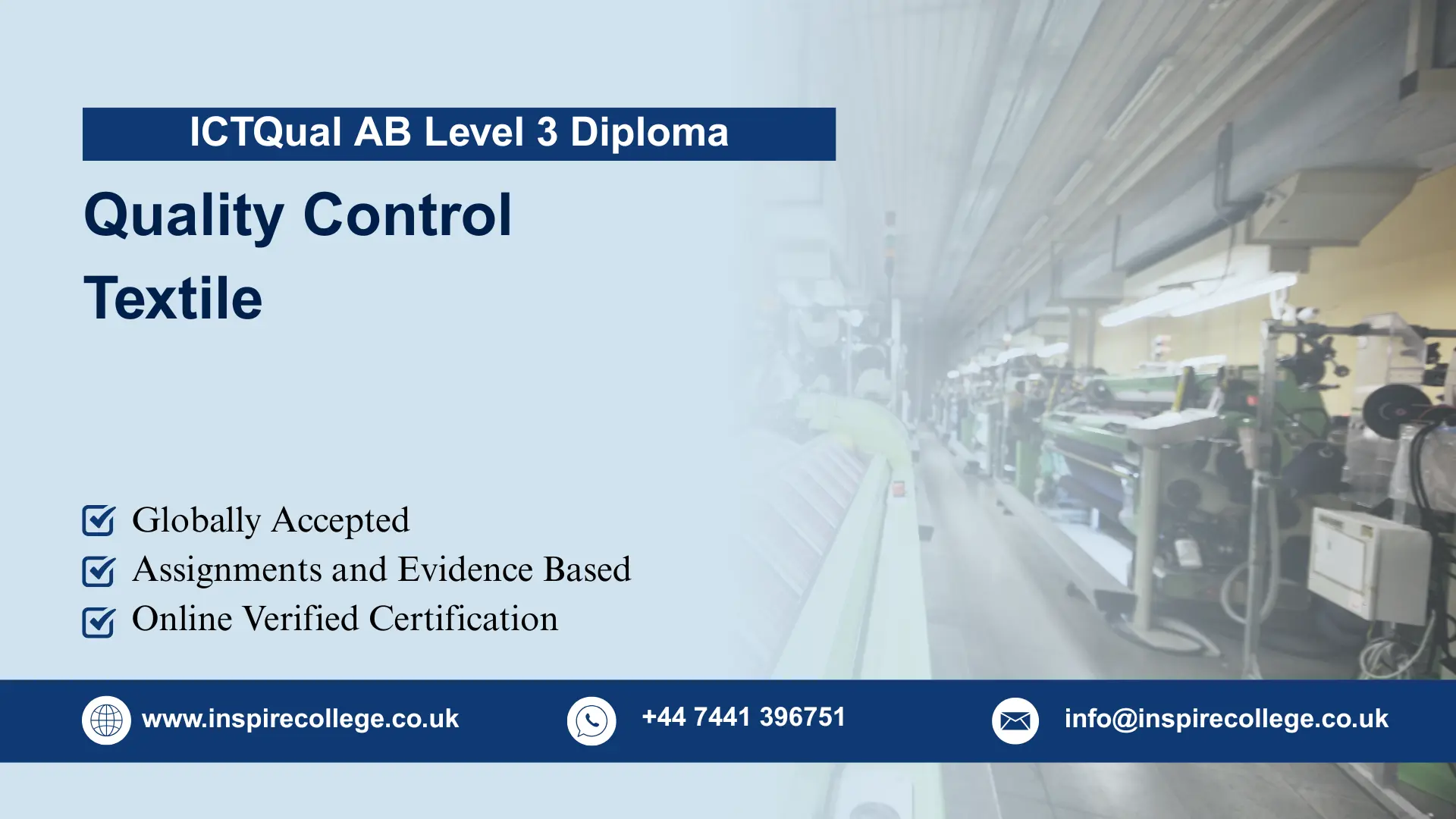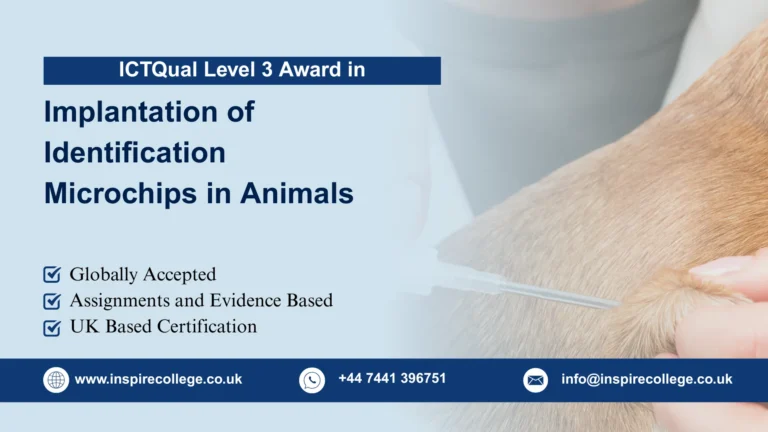
ICTQual AB Level 3 Diploma in Quality Control Textile
The ICTQual AB Level 3 Diploma in Quality Control Textile is a foundational qualification designed to prepare learners for technical roles within the textile and garment manufacturing industry. As global markets demand higher quality standards and product consistency, the need for skilled quality control professionals in textiles has become more vital than ever.
This diploma focuses on the fundamental principles of textile quality assurance, covering fabric inspection techniques, yarn and fiber testing, measurement standards, color fastness, and defect detection. Learners will gain an understanding of textile production processes and the tools used to maintain consistent quality throughout manufacturing and finishing.
Ideal for individuals beginning their careers in textile production, garment factories, or quality laboratories, the course combines theoretical knowledge with practical skills to ensure graduates are job-ready. It supports the development of a detail-oriented mindset and introduces learners to essential quality systems and compliance requirements.
Whether you’re entering the textile industry for the first time or transitioning from a general production role, this diploma provides the skills and confidence needed to contribute to quality assurance operations and ensure product excellence in fast-paced textile environments.
To ensure successful participation in the ICTQual AB Level 3 Diploma in Quality Control Textile, learners are expected to meet the following entry requirements:
- Age Requirement:Applicants must be 16 years of age or older at the time of enrollment.
- Educational Background:A secondary school education (high school level) or equivalent is required.
- Basic knowledge of mathematics and science is beneficial due to the technical aspects of textile testing and measurements.
- Work Experience: No prior work experience is required, making this diploma ideal for beginners.
- Candidates with some exposure to textile production, garment manufacturing, or factory settings will find it advantageous but not mandatory.
- English Language Proficiency: As the course is delivered in English, learners should have a basic to intermediate command of the English language.
- Recommended proficiency level: CEFR A2–B1 or equivalent.
- Acceptable forms of proof may include:
- Previous schooling in English
- Internal language assessment by the training provider
- IELTS score of 4.5 or higher (if applicable)
These requirements are designed to make the course accessible to a wide range of learners while ensuring that all participants can engage effectively with the course content and succeed in their learning journey.
Mandatory Units
This qualification, the ICTQual AB Level 3 Diploma in Quality Control Textile, consists of 6 mandatory units.
Mandatory Units
- Advanced Fabric Testing and Evaluation
- Statistical Quality Control in Textiles
- Statistical Quality Control in Textiles
- Garment Inspection and Quality Auditing
- Documentation and Record Keeping in QC
- Communication and Team Coordination in QC
Learning Outcomes for the Study Units:
1. Advanced Fabric Testing and Evaluation
By the end of this unit, learners will be able to:
- Understand the principles and standards of advanced fabric testing techniques.
- Conduct physical and chemical testing on fabrics, including strength, shrinkage, colourfastness, and pilling.
- Analyze test results to evaluate fabric performance and compliance with quality standards.
- Interpret international testing methods (e.g., ASTM, ISO) applicable to textiles.
- Apply laboratory-based and in-line testing procedures in real-time quality control settings.
2. Statistical Quality Control in Textiles
By the end of this unit, learners will be able to:
- Understand the fundamentals of statistical quality control (SQC) in textile production.
- Apply statistical tools such as control charts, histograms, and process capability analysis to monitor production quality.
- Identify trends, deviations, and non-conformance in textile processes using data-driven approaches.
- Implement corrective actions based on statistical analysis to improve quality performance.
- Communicate findings and quality trends using visual and written reports.
3. Process Control in Textile Manufacturing
By the end of this unit, learners will be able to:
- Understand the key stages of textile manufacturing processes (spinning, weaving, dyeing, finishing, etc.).
- Monitor and control critical process parameters to maintain consistent quality output.
- Identify sources of variation and implement control measures to reduce defects.
- Apply process control tools and techniques to improve productivity and minimize rework.
- Collaborate with production teams to establish quality checkpoints and ensure process integrity.
4. Garment Inspection and Quality Auditing
By the end of this unit, learners will be able to:
- Understand the principles and procedures of garment inspection at various production stages.
- Identify common garment defects related to stitching, sizing, labeling, finishing, and appearance.
- Perform in-line and final inspections following industry standards and buyer requirements.
- Conduct internal quality audits and prepare audit checklists and reports.
- Recommend corrective and preventive actions based on audit findings.
5. Documentation and Record Keeping in Quality Control
By the end of this unit, learners will be able to:
- Recognize the importance of accurate documentation in maintaining textile quality standards.
- Prepare and maintain quality control reports, inspection records, test data, and audit logs.
- Use digital and manual record-keeping systems to ensure traceability and compliance.
- Organize and retrieve QC documents for audits, client verification, and internal reviews.
- Ensure confidentiality, accuracy, and consistency in quality documentation practices.
6. Communication and Team Coordination in Quality Control
By the end of this unit, learners will be able to:
- Develop effective communication skills for reporting quality issues and sharing feedback.
- Work collaboratively with production, inspection, and management teams to resolve quality concerns.
- Demonstrate conflict resolution and negotiation skills in a team environment.
- Participate in quality meetings and contribute to continuous improvement discussions.
- Prepare and deliver clear, concise verbal and written communication in a QC context.
The ICTQual AB Level 3 Diploma in Quality Control Textile is designed for individuals who are enthusiastic about building a career in the textile and garment manufacturing industry, particularly in quality assurance and inspection roles. The ideal learner for this course may include:
- School leavers or recent graduates who want to enter the textile industry with a focus on quality control and production standards.
- Factory or production line workers in textile or garment units aiming to upgrade their skills and move into quality inspection or QA/QC roles.
- Individuals with basic technical or vocational training related to textiles or clothing manufacturing seeking a specialized qualification.
- Professionals transitioning from other sectors who are interested in beginning a career in the textile industry, especially in roles related to testing, compliance, and product evaluation.
- Workers in textile labs or finishing units who want to formalize their skills with a recognized qualification and advance their careers.
- International students or entry-level professionals looking to gain a solid foundation in textile quality control for employment or further study.
This course is ideal for learners who are detail-oriented, have an interest in materials and production processes, and are committed to maintaining high product standards in a fast-paced, quality-driven industry.
Register Now
FAQs for ICTQual AB Level 3 Diploma in Quality Control Textile






